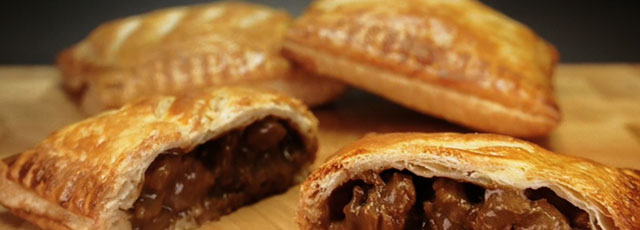These are Greggs Steak Bakes. They contain, amongst other things, Protein: 16.5g, Carbohydrate: 28g, Fat: 27.5g, Salt: 2g.
The chancellor of the exchequer, George Osborne, announced in his 2012 budget that VAT was to be applied to food sold hot in shop like Greggs. There is no VAT on most food in the UK but VAT is already levied on hot food such as takeaways. Crisps, nuts and ice creams are subject to VAT for some reason. So if you buy an Indian Takeaway, it is cooked for you and packaged, so it remains hot. You are therefore paying for more than just food, you are paying for a service.
The thing about Greggs is this. They shove a tray full of these things into their ovens, cook them, then pull the tray out and put it on their display units. These units are not heated, so the pasties and sausage rolls start to cool. If you are a Greggs regular you will know that when you go in to buy a corned beef pasty, a steak bake or the oddly titled ‘The Spicy One’, they may be hot but they may be anything but. Greggs put them out, sell them and then put some more out. So if you arrive when they have just taken a tray of your savoury snack of choice out of the oven, it will be so hot that it will burn your mouth for sure. At quiet times it’s entirely possible to buy the same product that has been sitting there for some time and is stone cold.
So how were they going to charge VAT on hot food that is cold? Not an easy one. The wording in the budget was that the tax would apply to food that is sold “above ambient air temperature”. But as I have already said, that is not always the case, it is entirely possible to buy a hot Greggs pasty cold. So from October, when the tax was due to come into effect, would they have had to temperature probe every savoury snack before they were sold to see if they were hot enough to be sold cold, and therefore VAT exempt? Or hot enough to be sold hot and therefore cost 20% extra adding about 22p to an average Greggs savoury snack?
Would Greggs customers arriving at the moment when the product of their choice was about to go cold be saying “I’ll hang on for a few minutes until it’s cold”? Imagine the queues, already long at busy times, getting even longer while people wait to buy an ambient hot pasty? A what? Yes, stupid wasn’t it. The government really didn’t have a clue on this one, it was a ridiculous idea and completely unworkable.
Would the shops have had to have a whole new row of buttons on their tills, one set for Hot and VAT and one set for Cold and Not? Could you see the odd not-so-honest worker ringing up a hot pasty cold and trousering the 22p? It was open to all sorts of problems and abuse and would have slashed profits from Greggs and other similar bakeries.
During my dedicated research into writing this article, I visited the Greggs website. I was surprised to find that I could not anywhere on their site find mention of the Greggs Corned Beef Pasty. This is another of their snacks, similar in appearance to the steak bake, but filled instead with a mixture of potato and corned beef, normally more potato that corned beef. Have they stopped selling those? I used to quite like them. When did this happen? Apart from the sausage rolls, they were always the cheapest of the Greggs savoury snacks, and I thought there were very popular, perhaps I was wrong.
Now the government have done a complete ‘U turn’ and the ‘Pasty Tax’ is dead, the government have changed the wording so that the tax now only applies to hot food that is kept hot and sold hot. It does not now apply to food that is allowed to cool. Shares in Greggs the Baker, which suffered after the budget announcement, will probably go back up, but it’s a black day for manufacturers of food temperature probes. As an aside I can recommend food temperature probes to anyone who enjoys having a barbecue. Probing your barbecue food is the best way to ensure that the food is properly cooked without the tradition of burning your sausages and burgers so that they are black as coal, just to be on the safe side. But that’s a whole different issue.
Although it will not now happen, there was, perhaps, an upside to the proposed ‘Pasty Tax’ and the clue is above. Look at the caption under the photo of the Steak Bake. I know these things are nice and tasty and tempting, but they are not that big, yet still contain 27.5 grams of fat. If the pasty tax had put some of us off the occasional impulse purchase of a savoury snack, it may well have kept our weight down. There are too many tempting fatty foods around already, anything that puts us off buying these things is surely a good thing that may ultimately save our lives, or at least prolong them long enough for us to have a few more weekends in the sunshine drinking copious amounts of red wine!
